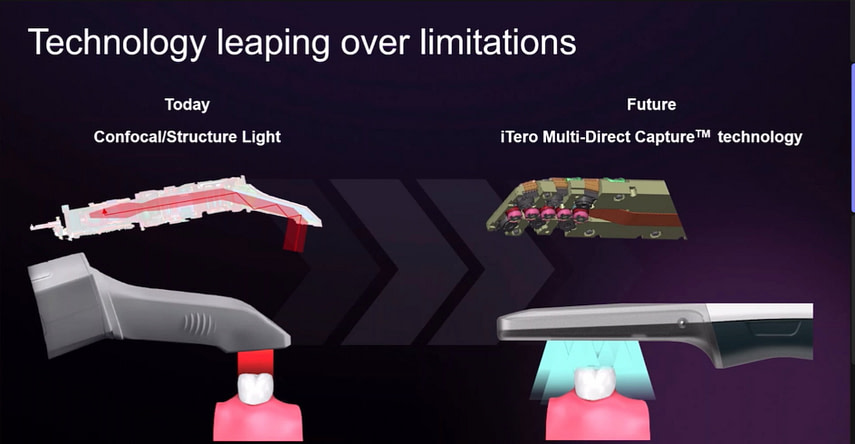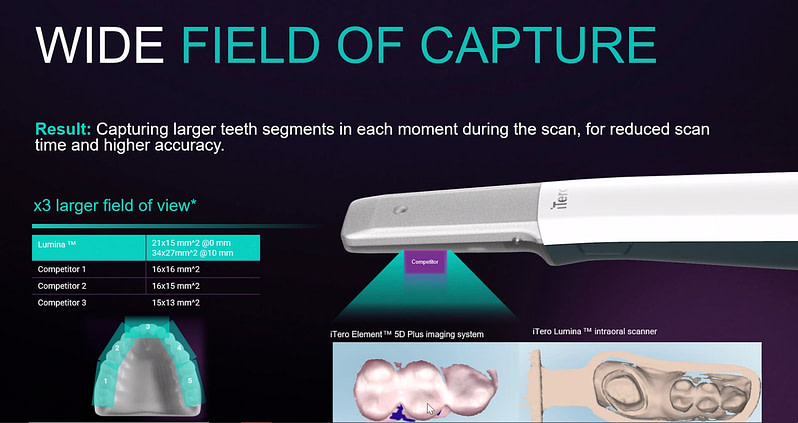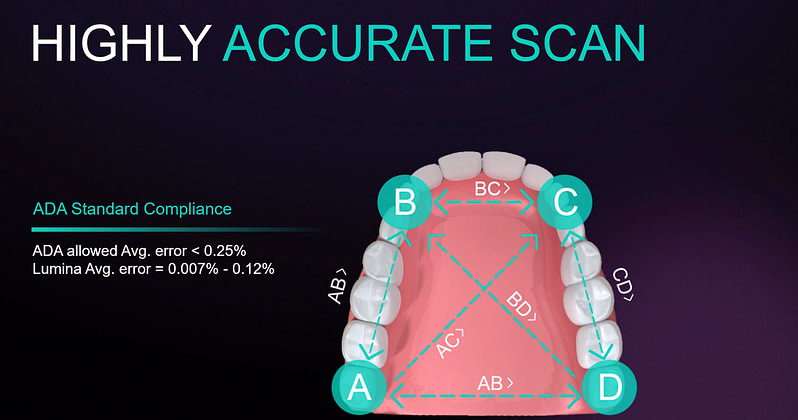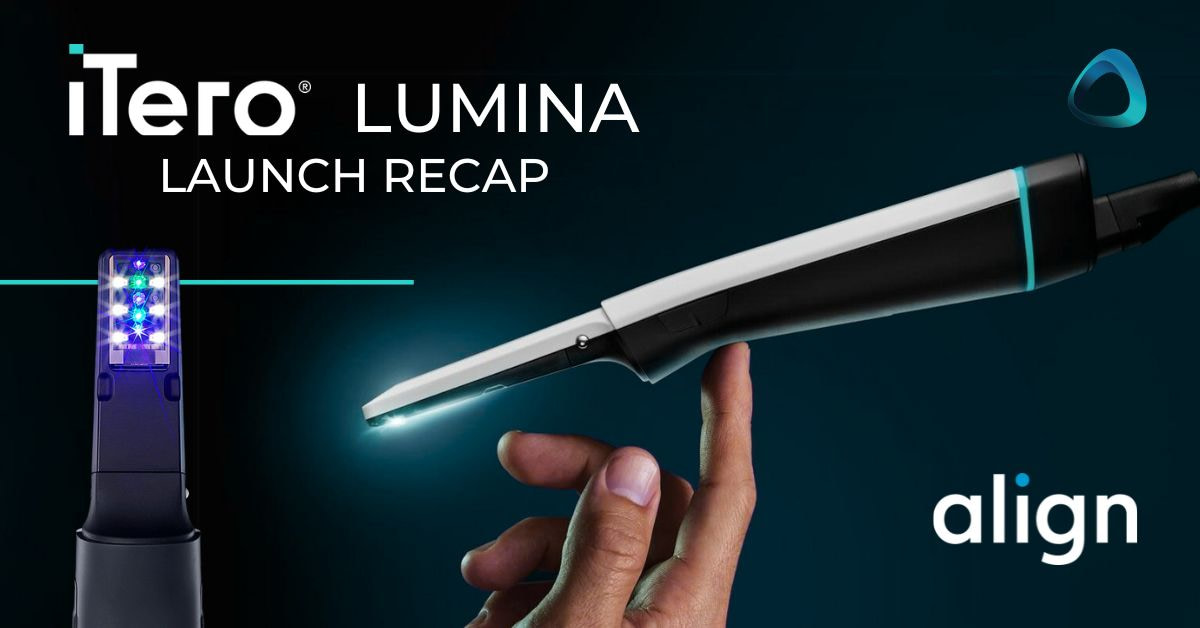In a globally live-streamed launch event just yesterday, on the 15th of February, Align Technology officially launched the iTero Lumina - the company’s first new intraoral scanner release since the iTero Element 5D in 2019!
It is nice to see iTero back in the game with a brand new scanner, as we have seen multiple releases from the likes of Medit, 3Shape, and Chinese intraoral companies like Alliedstar, RunYes, Eighteeth, Fussen and Panda.
There was no hint of a new iTero scanner at IDS 2023 but many were expecting it to come sooner or later. And here we are with the new flagship IOS from Align Technology.
We watched the launch event and wrote a quick summary of everything you need to know about the iTero Lumina.
Enjoy!
iTero Lumina Key Features
Here are some key features that the company announced during the event:
- No mention of price at the event.
- It is significantly smaller than any other iTero scanner at around 250 grams in weight. 50% smaller than Element 5D.
- A new restorative solution software is coming later in the year.
- The iTero Lumina can capture images from multiple angles at once, allowing what the company says are - faster, smoother, and more accurate scans.
- It has a large depth of field than some other IOS (up to 25mm), making it easier to scan tricky mouth regions, such as narrow or deep palates, edentulous spaces, and partially erupted teeth. We are curious how it will filter cheeks, tongues etc with such a large depth of field.
- Captures super life-like images and more detailed 3D models. The scans will apparently remove the need for the bulky digital cameras for traditional intraoral photos. We will let you know once we try it.
- Provides a more ergonomic scanning experience and removes barriers some dentists had with adoption.
iTero Lumina Multi-Direct Capture Technology
The biggest thing that Align Technology seems to be excited about is iTero Lumina’s Multi-Direct Capture Technology.
The idea is this - every other scanner on the market uses rear indirect illumination. Meaning the scanning technology itself is at the the back of the scanner and the light has to travel through the wand. This creates a trade-off between a large field of view and the size of the scanner wand.
Align have brought the capture technology to the tip of the scanner rather than using mirror tips to reflect the light to a sensor in the rear of the scanner body. This means the scanner will be smaller without compromising the field of capture.

With intraoral scanners, the field of capture is important. A larger field of capture allows for a faster scan with fewer stitching errors, but a large field of scan has previously meant a larger scanner - which isn’t always ideal for clinical use.
It’s like taking a 500-piece puzzle and reducing it to only 200 pieces. There are larger sets of data with fewer joins, which only makes the process of completing the puzzle easier and, therefore more accurate due to fewer stitching errors.
iTero Multi-Direct Capture technology allows for a larger field of capture without needing to have a larger wand the company claims. It’s essentially what the iTero Lumina is based on and promises a much better scanning experience.
The new iTero scanning techmology also uses 6 different scanning modules all at once rather than one at the back of the wand. This creates a very wide field of capture but the scanning modules are also at an angle to enable capturing more surfaces at once. Therefore the new iTero Lumina simultaneously captures from multiple angles at the same time.
They have also increased the scanning depth from 15 millimeters to 25 millimeters, which is now similar to most current intra-oral scanners. This will really help in scanning edentulous arches, edentulous spaces and deep preparations.
You no longer need to hold the scanner wand right up against the teeth like previous iTero scanners.

iTero Lumina Scan Stitching
Something that was noted repeatedly was that a lot of the panel found that the scanner now “works for them” instead of having to manipulate the scanner to get the best results. Once we test it we will let you know :).
Something interesting the company brought up is new algorithm allows you to scan how you like. With not specific scan strategy.
Similar to 3Shape TRIOS 5 or Medit where they allow the user to not use an ideal scan protocol but to scan in any way they like, and the algorithm will handle it and stitch it all together.
We still recommend following a scan protocol because as much as the algorithms can weave some magic, following a predictable path and allowing for the easiest stitching will still result in the best quality and highest accuracy scans. Also we find it is much faster than scanning haphazardly. If you need help with scanning, check out our free online training with CPD/CE inside the IDD Academy. Create your account today and get immediate access.

iTero Lumina Image Quality
The iTero Lumina will feature high-resolution, photorealistic scans. Something the company is super proud of and says look the best on the market.
As always, better scan colours and data allow for more effective patient communication - which can only be a good thing.
The company claims it will eliminate the need for additional photo-taking from your workflow. This will have to be seen to be believed. Mind you if you are not lecturing do you really need DSLR photographs?
The panel of speakers was much happier with the image quality of the iTero Lumina. They say it was a lot easier to capture the palette with the new scanning depth and explain to patients what’s going on in order to propose treatment.
iTero Lumina Size and Weight
The biggest downside of ALL iTero scanners in the past, including the Element 5D, was its size and weight. It was one of the biggest scanners on the market and was challenging to use in posterior areas of the mouth. It wasn’t really as ergonomic a scanner as the rest of the market, and this was noted by the panel of speakers. We also have mentioned this in our multiple reviews of the iTero scanners.
It seems like Align Technology has finally listened to the complaints because the iTero Lumina is 50% lighter and is half the weight of its predecessor. So it comes around 250 grams.
With the increased scanning depth and Multi-Direct Capture Technology, the panel says this is an excellent scanner for patients with a high gag reflex or when you need to scan small, tight, or edentulous areas.
Previous large scanning tips made it quite challenging to scan some patients and were quite uncomfortable to use for long periods of time. With this new scanner, it looks like iTero are back in the game.

iTero Lumina Restorative Solution
Something we have mentioned in our reviews of the iTero scanners is that they are not really optimized for restorative workflows. Not only because of the size but also the scanner software, which in reality really focussed on Invisalign.
It sounds like the company is listening. And we are all for it.
iTero revealed that it will release a new restorative solution software later in the year. This is exciting and great to hear the company is taking restorative workflows seriously. Plus the reduced scanner size should undoubtedly help with restorative scanning.
Quite often at iDD, we see many people who join our Free iDD Academy note that they use an iTero, but it’s often with another scanner brand or two that they use for restorative purposes. It will be interesting to see how that changes with this new solution coming later this year.
iTero Lumina Backwards Compatibility
The company noted that the iTero Lumina will be compatible with all previous Plus series carts and previous releases, which is excellent for anyone who’s been using iTero for some time.
It obviously means the upgrading process will be pretty smooth and they will also be having a trade-in option for those who have older iTero scanners and want to upgrade.
iTero Lumina Price
There was no mention of price during the launch event, which is quite interesting. Do they expect blowback?
iTero scanners have long been some of the most expensive on the market, and avoiding discussing price during a launch event seems strange to me.
Since they have not come out and talked about price, I will guess that it will not be competing with the super economic end of the market.
With the 3Shape TRIOS 5 being priced around $25K, it would be surprising if they priced it more than that.
Will iTero push the exclusivity of the Invisalign system and keep a prohibitively high price point? Or will they use this scanner to capture more market share now that the scanner market has exploded globally?
Time will tell.
Final Thoughts on the iTero Lumina Launch
So there you have it; that’s everything we learned from the iTero Lumina launch event.
The iTero Lumina has been six years in the making.
The question is, have they been resting on their laurels for too long and is this significant leap forward enough to help them regain market share?
My first impression is that the Multi Direct Capture System looks to be an actual advancement in intraoral scanning technology. Which is great to see and honestly an exciting improvement in IOS devices.
If the hype is real, it will make a clinician's life easier, the patient experience better, and allow for faster, more accurate, and easier scanning experiences, which can only benefit the whole industry.
We have been waiting for years to actually see a significant change or advancement in scanning technology. While we still believe most of the experience is in the software and workflows the scanner enables, having a larger capture window that reduces stitching errors and user problems is a good thing.
It will be very interesting to see how this scanner is priced and how the market responds.
Stay tuned for this review, and let me know your thoughts in the comments below.

